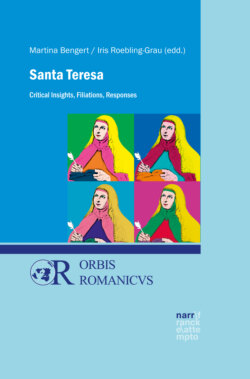Читать книгу Santa Teresa - Группа авторов - Страница 28
На сайте Литреса книга снята с продажи.
II Santa Teresa – On Aesthetics Teresa de Jesús: “The Power of Words”
ОглавлениеJUAN ANTONIO MARCOS O.C.D.
Teresa of Ávila was a woman in an era of widespread misogyny, in which a woman was looked down upon simply for being a woman. But Teresa never stopped defending her precious freedom and a place in the society in which she lived. She was a mystic in a time when suspicion and distrust reigned supreme, but in spite of this she did not give up her right to live her experience and to recount it – both of which she did as passionately as she did lucidly. I will re-read and revisit Teresa from the perspective of language. It is Teresa’s language which has the power to create and re-create experiences.
If indeed, as Miguel de Unamuno says, “mysticism is philology”,1 then language is an inescapable dimension if one wants to know Saint Teresa. This means that to get closer to Teresa we must ‘let the text speak for itself’. The texts are, of course, the greatest relic that we have of the Saint. Whenever language is overlooked, we lose one of the most entertaining and enchanting dimensions of this linguistically creative woman who was read by and from whom Cervantes learned so much (as Aurora Egido has pointed out2). Above all, Teresa cultivates an open and loose style that refuses to submit to the rules. Her language is nothing less than a portrait of her persona and her mystical experience.
It is possible that the best word to define Teresa’s language (and indeed her life, her spirituality and almost everything about her) is its ‘naturalness’. This ‘naturalness’ (in contrast to affectation of any kind) is a term coined by Juan de Valdés in his famous Diálogo de la lengua (1535-1536): “To tell you the truth, I observe (i.e. abide by) very few things, because the style I have is natural to me and without affectation of any kind whatsoever; I write as I speak.”3 Thanks to this naturalness, when one reads Teresa’s writings, one always has the feeling of watching a ‘live’ broadcast (in ‘streaming’) of that surprised and dissident intimacy Teresa knows she is part of. This is then a kind of literature in which Teresa lays bare the soul, her soul, before the reader.
In the same way that the language of faith must lead to action and commitment, 4 the same applies to the language of mysticism: it is “[…] en los efectos y obras de después se conocen estas verdades de oración, que no mejor crisol para probarse” (“[…] in the effects and deeds following afterward that one discerns the true value of prayer; there is no better crucible for testing prayer”) (4M 2,8).5 In this manner, all spiritual experience can be authenticated. And it is in the power of mystics to affect readers’ lives – to infect them, to move them – in which the force of mystical language resides. If the divine logos has the power to create – “estotra que habla el Señor es palabras y obras […] sus palabras son obras” (“Those the Lord speaks are both words and works […] His words are works”) (V 25,3) – , as Teresa reiterates, the human word also has a similar power, as we were created to be creators. And so it is with Teresa and her words.
Probably the two notes that best define the language of mystics (and theology in general) are analogy and performativity. Analogy, in its broad sense,6 refers to descriptive statements of what one observes: it seeks to describe how language functions. Performativity, on the other hand, refers to utterances that perform actions, known as speech acts: it seeks to explain how the said language operates or acts, affecting our lives. These are the central and primary features of mystical language7 in general terms.
What changed in the twentieth century was the importance attributed to language in the origin of our actions. Was the ‘word’ not in the beginning and was it not the ‘word’ that created reality according to the biblical creation myth? Here lies the power of words, of those words that affect us, and that we also use to affect the lives of others: words choke us or they cut through us; we struggle to digest them; they are sweet or bitter; they are food for the spirit (‘man does not live on bread alone, but from every word that comes from the mouth of God’); they can wound or heal (‘a word of yours suffices to heal me’). This is the performative power of words.
We are talking here about those words that are acts – truly speech acts – words by which Teresa feels affected and words that she herself uses to affect the lives of her readers, to whom her works are addressed. To do so she employs formulae of empowerment in a splitting of the Teresian ‘I’ into authority and modesty. Later on we will see the force that divine words have on Teresa herself, and we venture further into that very peculiar genre that are the ‘divine audiences’ or ‘sayings of the Lord’. Finally, we will hear the echo of her continual battles with words (the ineffability of mystical language): their power, the struggle with them, and the yearning for new words.
